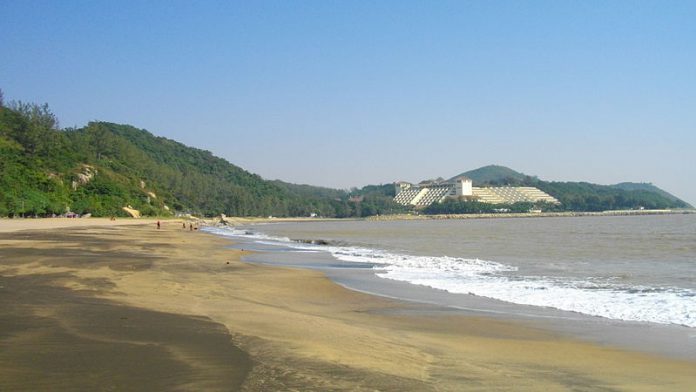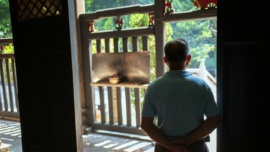Overnight accommodation in Macau for MOP5?
Yes, it is possible.
Increasingly difficult, but possible.
The ‘secret’ lies in Hác-Sá Beach Camping, the only campsite run regularly by the MSAR.
For local residents, one night in this park costs MOP5, and there is always a zone (designated Zone C) reserved for them.
The problem is that more and more tourists seem to be using Hác-Sá camping as an alternative to the high prices of hotels in Macau, with records showing that areas for non-residents – although they cannot be booked online – are often overwhelmed by demand.
But if you find MOP5 expensive (!) there is an even cheaper alternative – also in Coloane: In the Ká-Hó Reservoir Natural Park there is a camping area (Outdoor Experience Camp) that allows you to enjoy the space free of charge as long as bookings are made in groups. In any event, the Civic and Municipal Affairs must be asked in advance.
And we continue in Coloane, looking for cheap accommodation and different from that that generally exists in the Region: the two youth hostels (in Hác-Sá and Cheoc Van) offer accommodation at reduced prices. A four-bed room costs between MOP60 and MOP80. Prices are higher for foreign users, and in this case the hostels have a tight policy regarding the profile of such clients preferring youth organisations, exchanges or holders of international cards, for example.
Also in Cheoc Van sits one of the most unique hotels in Macau, the Pousada de Coloane, which presents itself as “the only beach boutique hotel in Macau” (28 rooms only).
Built in the 1930’s as a manor house, and transformed into a hotel in the mid-1970’s, it started operating as a beach hotel in 1977 – and is thus one of the oldest in Macau.
“Surrounded by mountains, embraced by the forest and overlooking the sea,” Pousada de Coloane is a hotel that assumes Portuguese tradition, where the cultural marks of the former coloniser are very evident – they don’t hesitate to claim, for example, a “colonial style ambience” – and is one of the few examples of ecotourism in Macau.

“As we know, ecotourism is so popular nowadays. Ecotourism is environmentally responsible travel to natural areas in order to enjoy and appreciate nature. Ecotourism is distinguished by its emphasis on conservation, education, traveller responsibility and active community participation. Therefore, I think Coloane can perform green lung and tourism also. It depends upon policy,” Ho Wai Ting of the Macau Ecological Society told Macau Business.
And to complete the range of tourist accommodation options in Coloane one should not forget to mention the aircraft carrier, the Grand Coloane Resort.
Formerly the Westin Resort, opened in 1993, it continues to be much sought after by “holidaymakers who prefer the green resort at a short drive away from Macau’s action” (according to a Shun Tak financial report). That is, it does not have a casino . . .
Grand Coloane Resort, with its 208 rooms aimed at a “niche market”, boasts a room occupancy rate of 81 per cent, with the adjoining golf course, one of two in Macau, one of the main attractions.
Just one project
In recent years, apart from The 13, no new hotel projects have been started in south Coloane.
As we have seen in the main story of these pages, what exists today is what has existed for at least 20 years.
Last year, a proposal to build a third hotel on the ‘island’ finally arrived, but the process was soon marked by controversy: it is about trying to reconvert a luxury building, built in 1992 in Cheoc Van, to a low-cost hotel. Town Planning Council president Li Canfeng said the request “is legally binding” but residents of the luxury condominium Cheoc Van Gardens immediately tried to stop the project.
Indifferent to these movements is the village of Coloane, which has decided to shun the tourist deluge, maintaining its historical characteristics.
Hence, the government’s objective is ‘to find a balance between urban development and environmental protection, with the aim of stimulating tourism development.’
Macau Government Tourist Office understands that “Coloane Island has very rich ecotourism resources,’ which is why it ‘has created tourist products suitable to attracting the presence of visitors.”
Emerged and immersed area
The Dean of the Institute of Science and Environment of the University of Saint Joseph, David Gonçalves, not only advocates the need for “an integrated development strategy, associated with a master plan” for Coloane.
Speaking to Macau Business, he recalled that “the interest in protecting Coloane is reinforced by the recent allocation of a maritime area of 85 square kilometres to the territory.”
Hence, the suggestion made by Professor Gonçalves: “An interesting project could be to consider a reserve area that integrates part of the emerged and immersed area of Coloane in order to protect the local biodiversity; namely, some species with a priority conservation character, such as the White Chinese Dolphins (Sousa chinensis) of the Pearl River estuary.”
























